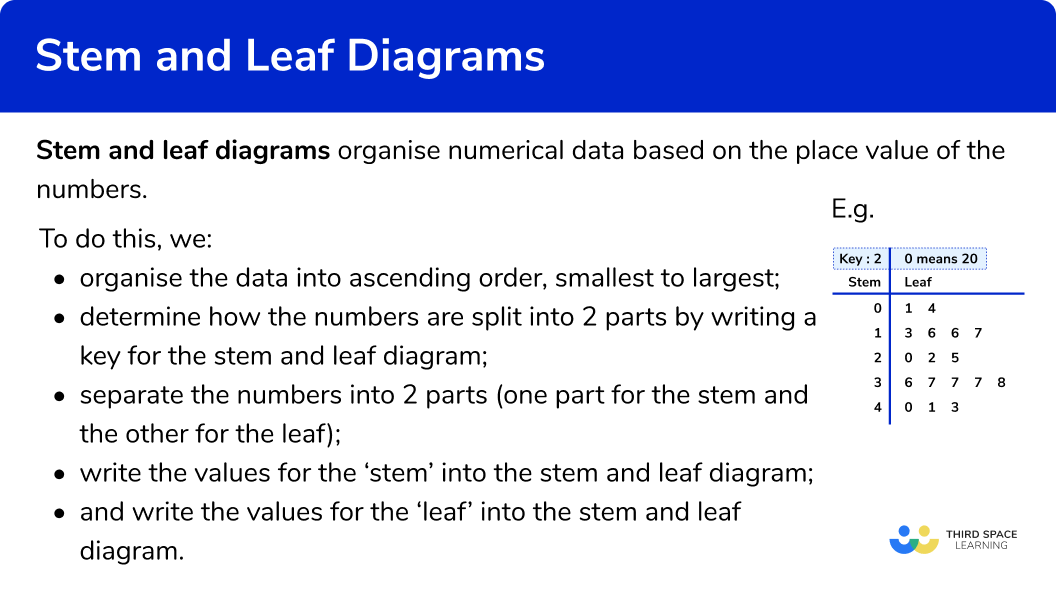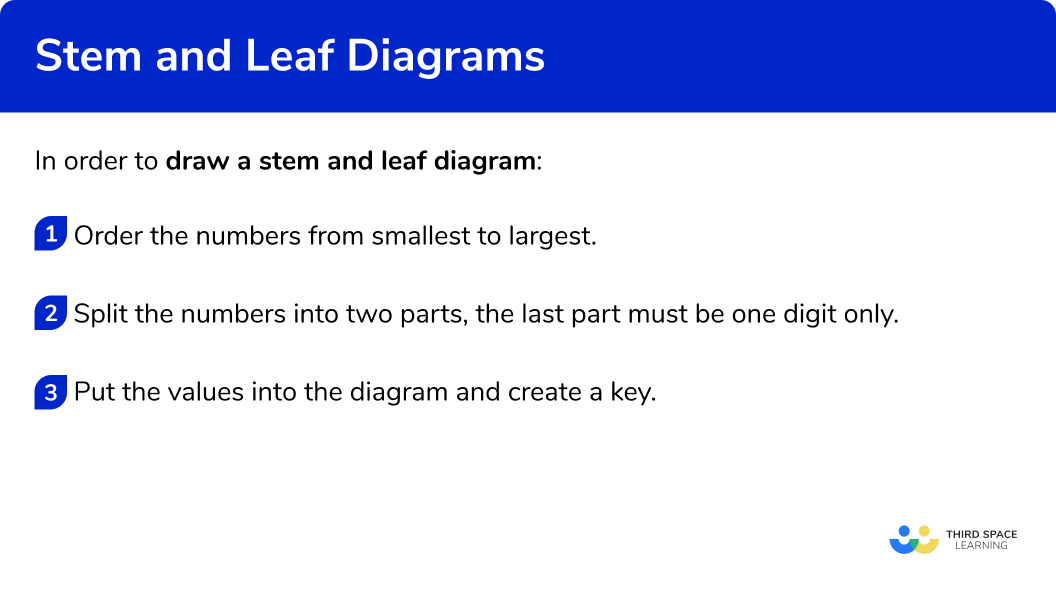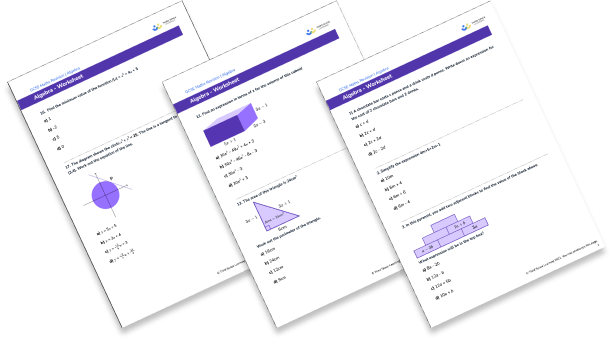GCSE Tutoring Programme
"Our chosen students improved 1.19 of a grade on average - 0.45 more than those who didn't have the tutoring."
In order to access this I need to be confident with:
Place value Factors and multiples Arithmetic Mean, median, mode RangeThis topic is relevant for:

Stem And Leaf Diagram
Here we will learn about stem and leaf diagrams, including drawing, interpreting and comparing diagrams.
There are also stem and leaf diagram worksheets based on Edexcel, AQA and OCR exam questions, along with further guidance on where to go next if you’re still stuck.
What is a stem and leaf diagram?
A stem and leaf diagram is a method of organising numerical data based on the place value of the numbers.
Each number is split into two parts.
- The first digit(s) form the stem,
- The last digit forms the leaf.
The leaf should only ever contain a single digit.
For example, the number 154 would be split into two parts where the digits \bf{15} would be the stem and \bf{4} would be the leaf.
To set up a stem and leaf diagram we need to:
- Organise the data into ascending order, smallest to largest;
- Determine how the numbers are split into 2 parts by writing a key for the stem and leaf diagram;
- Write the values for the ‘stem’ into the stem and leaf diagram;
- Write the values for the ‘leaf’ into the stem and leaf diagram.
Note: A stem and leaf diagram must have a key (sometimes referred to as a legend). This explains how to convert the digits in the stem and leaf diagram into a single data point. Remember to include any units in the key if appropriate.
We can use stem and leaf diagrams to calculate averages like the median, the mode and the mean, and to calculate measures of spread like the range and the interquartile range.
What is a stem and leaf diagram?

Dual stem and leaf diagram
Comparing data sets is simplified by using a dual stem and leaf diagram which have two sets of data represented back to back.
For example, here are two sets of data showing test scores of 20 males and 20 females.
By combining them together to form one dual stem and leaf diagram, we can directly compare the two sets of data.
The data must be closely related for it to be compared effectively on the diagram.
Note that the digits in the leaf for Females is still in ascending order but from right to left, rather than left to right. Also, the key represents the data values for each side of the stem and leaf diagram.
How to draw a stem and leaf diagram
In order to draw a stem and leaf diagram:
- Order the numbers from smallest to largest.
- Split the numbers into two parts, the last part must be one digit only.
- Put the values into the diagram and create a key.
How to draw a stem and leaf diagram


Stem and leaf diagram worksheet

Get your free stem and leaf diagram worksheet of 20+ questions and answers. Includes reasoning and applied questions.
DOWNLOAD FREE
Stem and leaf diagram worksheet

Get your free stem and leaf diagram worksheet of 20+ questions and answers. Includes reasoning and applied questions.
DOWNLOAD FREERelated lessons on representing data
Stem and leaf diagram is part of our series of lessons to support revision on representing data. You may find it helpful to start with the main representing data lesson for a summary of what to expect, or use the step by step guides below for further detail on individual topics. Other lessons in this series include:
Stem and leaf diagram examples
Example 1: two digit numbers
The data below shows the ages of people at a party.
35,\quad \; 50,\quad \; 37,\quad \; 44,\quad \; 53,\quad \; 41, \quad \; 39,\quad \; 45,\quad \; 48, \quad \; 56Draw an ordered stem and leaf diagram for the data. Remember to include a suitable key.
- Order the numbers from smallest to largest.
becomes
35,\quad \; 37,\quad \; 39,\quad \; 41,\quad \; 44,\quad \; 45, \quad \; 48,\quad \; 50,\quad \; 53, \quad \; 562Split the numbers into two parts, the last part must be one digit only.
The number in our data will split into tens and units so 35 will be 3 and 5 \; (3 represents 30 and 5 is 5 units)
3Put the values into the diagram and create a key.
Example 2: three digit numbers
The data below shows the length in centimetres of 13 long jumps on a year 9 sports day.
153, \quad \; 144, \quad \; 148, \quad \; 140, \quad \; 149, \quad \; 145, \quad \; 144, \quad \; 142, \quad \; 158, \quad \; 135, \quad \; 140, \quad \; 139, \quad \; 160.Draw an ordered stem and leaf diagram for the following set of data. Remember to include a suitable key.
Order the numbers from smallest to largest.
becomes
Split the numbers into two parts, the last part must be one digit only.
The number in our data will be split into two parts, 148 will become 14 and 8 \; (14 represents 140 and 8 represents 8 units).
Put the values into the diagram and create a key.
Example 3: decimal values
A group of students are making model gargoyles out of clay. The weight of each gargoyle is written below.
\begin{aligned} &1.5kg \quad \; 2.3kg \quad \; 1.6kg \quad \; 3.1kg \quad \; 3.1kg \\ &1.4kg \quad \; 2.5kg \quad \; 1.7kg \quad \; 1.8kg \quad \; 2.4kg \end{aligned}Draw an ordered stem and leaf diagram for data. Remember to include a suitable key.
Order the numbers from smallest to largest.
becomes
Split the numbers into two parts, the last part must be one digit only.
As the numbers are decimals they are split like this – 1.4kg splits into units (1) and tenths (4) .
Put the values into the diagram and create a key.
Example 4: answering questions using a stem and leaf diagram
The stem and leaf diagram below shows the ages of a group of people at a party.
How many people are there in the group?
Count all the numbers in the leaf, so the answer is 10 people.
What age is the youngest member of the group?
The first number in the leaf is the smallest value, so the answer is 35 years old.
What age is the oldest member of the group?
The last number in the leaf is the largest value, so the answer is 56 years old.
How many people are under \bf{45} ?
Count all the values in the leaf that are less than 45, so the answer is 5 people.
How many people are \bf{45} and over?
Count all the people in the leaf that are 45 and above, so the answer is 5 people.
Example 5: calculating averages and the range from a stem and leaf diagram
The stem and leaf diagram below shows the weight of 10 puppies in kilograms
Write down the modal weight.
The mode is the most frequent value, so the mode for this set of data is 3.4 \; kg, as it occurs twice.
Find the median weight.
The median is the middle value. As there are 10 values, the median is located in the position \frac{10+1}{2} =5.5. Count 5 and a half places, in this case that is between 3.4 and 3.4 (add them up and divide by 2) gives us a median of 3.4 \; kg.
Find the range of the weights.
The range is calculated by subtracting the lowest value from the highest value, giving us 5.1-1.9 = 3.2kg.
Find the mean weight of the puppies.
The mean is calculated by adding up all the numbers and dividing by the number of values so, 1.9 + 2.2 + …..+ 5.1 = 35.1. Dividing by 10, we get a mean of 3.51 \; kg.
Example 6: dual stem and leaf diagram
This dual stem and leaf diagram shows the results for the students in Miss Thomas’ class.
Find the range of the boys’ results.
The range is found by subtracting the lowest from the highest values on the ‘boys’ side of the diagram.
45-12 = 33
The range is 33.
Find the median of the girls’ results.
The median is the middle value on the girls side of the diagram. There are 11 values so the middle value is found by adding 1 and dividing by 2. (11 + 1) \div 2 = 6th place. The median is therefore 26 .
Find the modal mark for the boys’ results.
The mode is the most common number.
Here, the mode is 38 as it is the most frequent value for the boys.
Compare the boys’ and girls’ results.
We need to compare the median and range for each set of data:
The boys did better on average (median =33) than the girls (median =26) .
The girls’ marks (range =42 ) were more spread out than the boys (range =33) .
Common misconceptions
- Incorrectly reading the numbers in the diagram
For example, for the following stem and leaf diagram, the value of 13\rvert5 is misinterpreted as the value 5, instead of 135 .
- Miscounting
A common error is to incorrectly count the numbers in a stem and leaf diagram when calculating an average or range. It is a good idea to mark off each number to avoid missing a number out
- More than one digit for the leaf
The leaf must only be one digit, otherwise the data can be greatly misinterpreted. Make sure that the smallest place value for the data is used for the leaf.
Practice stem and leaf diagram questions
1. Which stem and leaf diagram matches this data?
\begin{aligned} &29cm \quad 60cm \quad 51cm \quad 34cm \\ &42cm \quad 61cm \quad 46cm \quad 36cm \\ &63cm \quad 50cm \quad 57cm \quad 53cm\\ &60cm \quad 39cm \quad 47cm \quad 40cm \end{aligned}
Use the key 2 \rvert 1 \text{ represents } 21 cm .




By checking the highest and lowest values from the list ( 29 is the lowest and 63 is the highest) we can see that the correct stem and leaf is
2. The stem and leaf diagram below shows heights of Mrs Wilks’ flowers in centimetres.
What is the range of the height of Mrs Wilks’ flowers?




The range is found by subtracting the lowest value from the highest value. 41-9 = 32cm
3. Below is a stem and leaf diagram showing the scores of 18 javelin throws in a school sports day. The longest throw wins.
What was the mean distance thrown?




The mean is the sum of all the values, divided by the total number of values.
5+8+9+10+10+14+16+17+20+21+22+25+26+29+30+31+32+34=359m
359 \div 18=19.9\overline{4}m=19.9m \; (1dp)
4. The stem and leaf diagram below represents a sample of the lengths of leaves from a tree.
Which average would be the most suitable to represent the data?
Mean

Median

Range

Mode

As there is one value that is very large, this would affect the mean and the range. The mode is not suitable because it does not use all of the data.
The median is most suitable as this is not affected as much as the mean when we have more extreme values.
5. The stem and leaf diagram below shows the maximum weight of a deadlift lifted by each competitor in a weightlifting competition.
Everyone managed to record at least one lift.
What was the median weight lifted?




The median is located at the middle position in the data. 17 \div 2=8.5^{th} value. This value lies between 220lbs and 220lbs.
As these two values are the same, the median is 220lbs .
6. 42 people competed in a local 3 legged race. The time for each pair was recorded in a back to back stem and leaf diagram.
Select the completed stem and leaf diagram for the adult race using the results below.
16.3s \quad 18.1s \quad 15.9s \quad 16.1s \quad 17.4s \quad 18.9s \quad 17.5s




The values are written:
- In the correct row
- In order (right to left) from the stem
- On the left hand side of the stem and leaf diagram
Stem and leaf diagram GCSE questions
1. Here are the ages of 14 people in years.
\begin{aligned} &42 \quad 34 \quad 55 \quad 39 \quad 40 \quad 51 \quad 47 \\ &39 \quad 42 \quad 55 \quad 42 \quad 48 \quad 49 \quad 42 \end{aligned}
Draw an ordered stem and leaf diagram for their ages.
(3 marks)
For all values in the stem and the leaf that match the data
(1)
For numbers in ascending order
(1)
For a suitable key
(1)
2. The number of people visiting a restaurant each day, for 11 days, is listed below.
104 \quad 131 \quad 120 \quad 115 \quad 109 \quad 124 \quad 128 \quad 118 \quad 116 \quad 120 \quad 125
(a) Use the key to complete an ordered stem and leaf diagram for this information.
(b) Write down the mode.
(c) Write down the median
(d) Write down the range.
(5 marks)
(a)
Data ordered smallest to largest
(1)
Numbers correctly inputted into the stem and leaf diagram
(1)
(b) 120
(1)
(c) 120
(1)
(d) 131-104 = 27
(1)
3. The head of modern languages is looking at the year 11 mock exam results for German and Spanish.
The results are shown below in the stem and leaf diagram:
(a) What is the modal score for Spanish?
(b) What is the modal group for German?
(c) What is the difference between the range for German and the range for Spanish?
(d) Compare the median value for the two subjects and comment on the pupils’ performance.
(6 marks)
(a) 57
(1)
(b) 70-79
(1)
(c)
Median (German) = 65, Median (Spanish) = 60
(1)
Range (German) =45 , Range (Spanish) =57
(1)
57-45=12(1)
(d) The median for German is greater than the median for Spanish suggesting that the pupils achieved better overall in German.
(1)
Learning checklist
You have now learned how to:
- Interpret and construct tables
- Construct and interpret diagrams for discrete data
- Interpret, analyse and compare the distributions of data sets from univariate empirical distributions through appropriate graphical representation involving discrete data
The next lessons are
Still stuck?
Prepare your KS4 students for maths GCSEs success with Third Space Learning. Weekly online one to one GCSE maths revision lessons delivered by expert maths tutors.

Find out more about our GCSE maths tuition programme.